Unit 11 Research Project: Talent Management Strategies Report
VerifiedAdded on 2022/12/29
|34
|7784
|437
Report
AI Summary
This report, focusing on Zara, delves into the critical realm of talent management, exploring strategies for employee development, retention, and overall organizational success. It begins by defining talent management and its significance, emphasizing the importance of attracting and retaining employees to enhance performance. The report investigates various talent management strategies, including clear job descriptions, training programs, and performance reviews, highlighting their impact on employee morale and productivity. It also analyzes the benefits of these strategies, such as improved hiring processes, increased employee engagement, and a competitive advantage in the marketplace. The research aims to determine different talent management strategies used by a company to be successful, with objectives including understanding the concept of talent management, identifying effective strategies, and determining their benefits. The report further explores Zara's specific talent management practices, emphasizing its commitment to employee training and empowerment. The methodology includes data analysis and interpretation to understand the research outcomes, and it concludes with recommendations for effective talent management implementation.
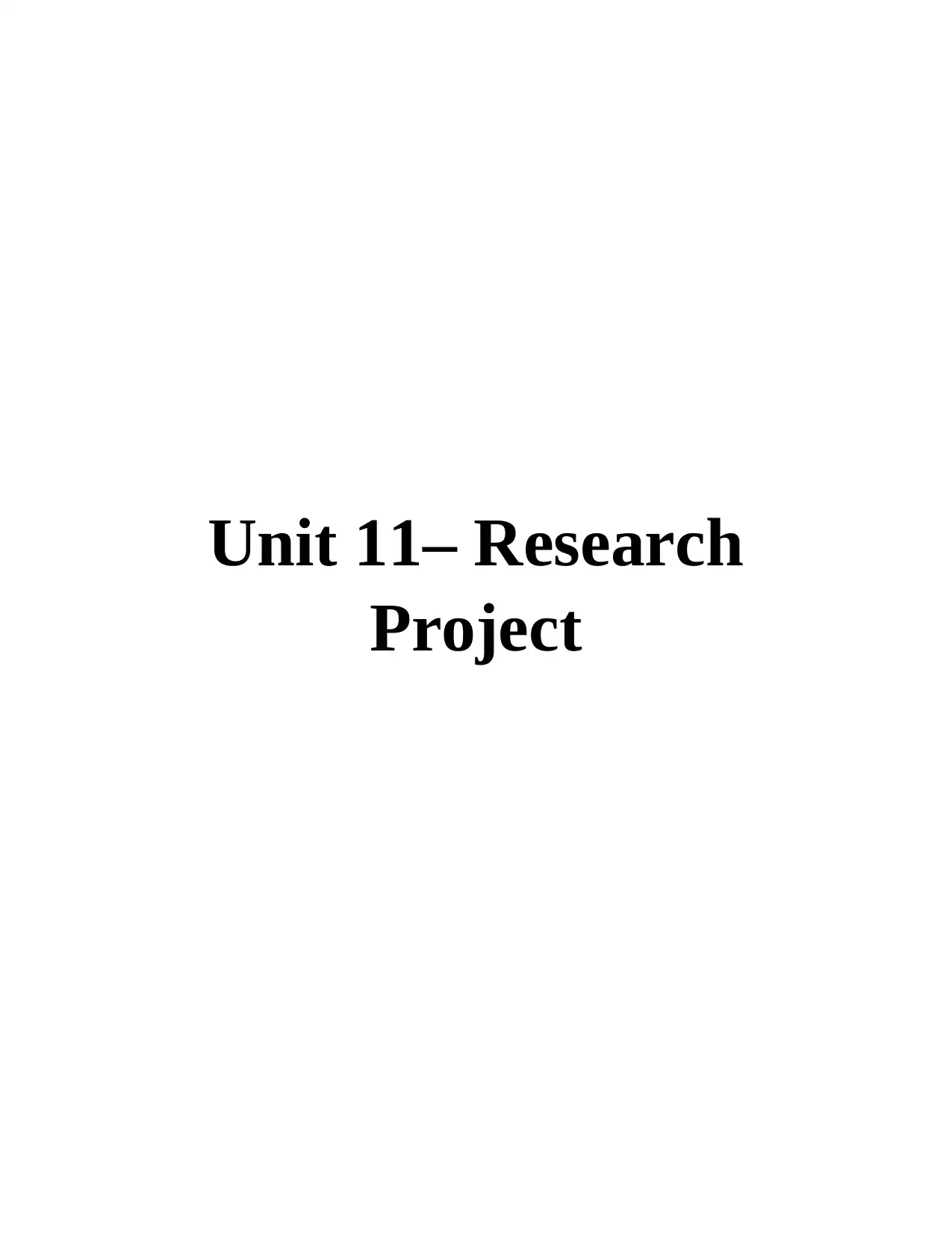
Unit 11– Research
Project
Project
Paraphrase This Document
Need a fresh take? Get an instant paraphrase of this document with our AI Paraphraser
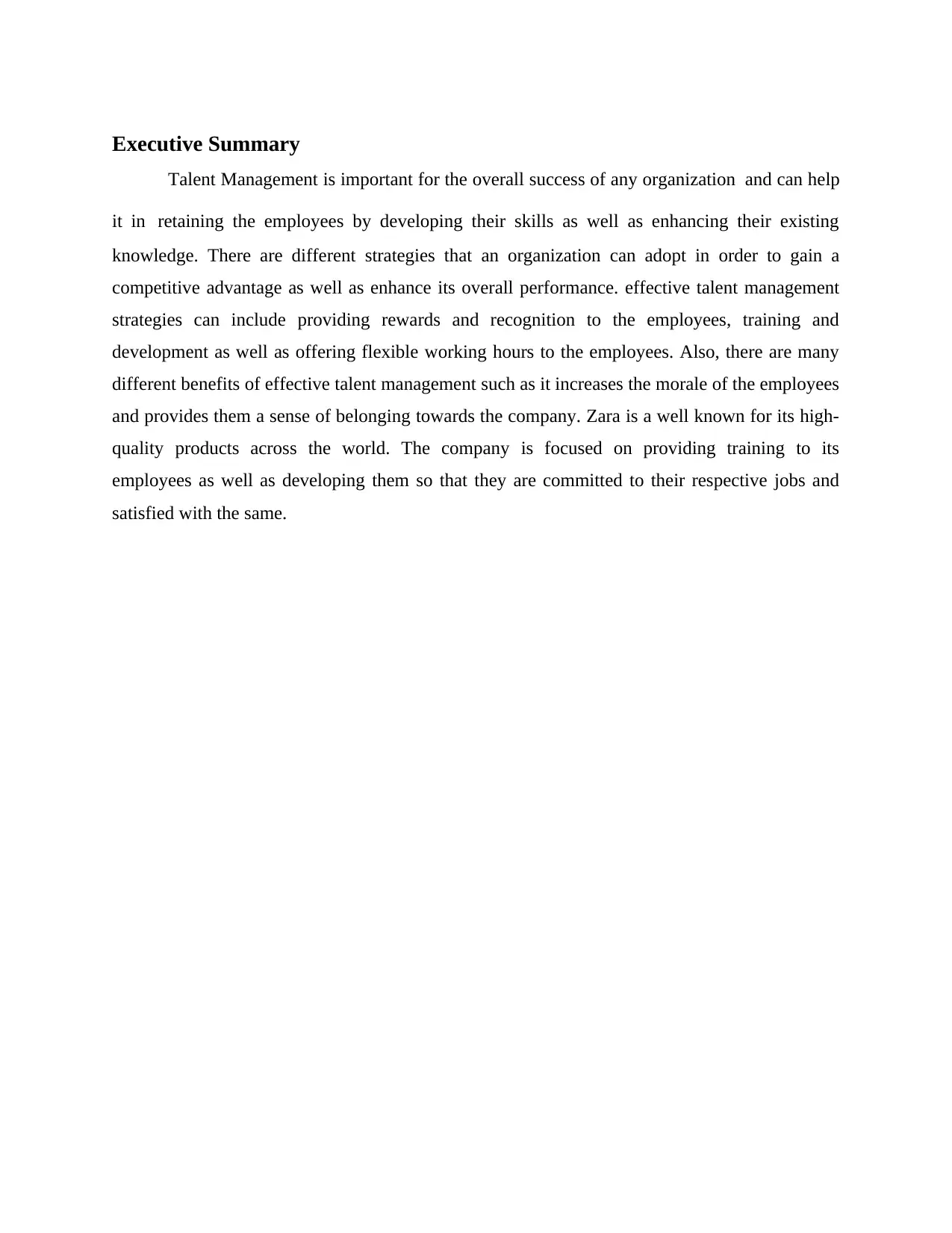
Executive Summary
Talent Management is important for the overall success of any organization and can help
it in retaining the employees by developing their skills as well as enhancing their existing
knowledge. There are different strategies that an organization can adopt in order to gain a
competitive advantage as well as enhance its overall performance. effective talent management
strategies can include providing rewards and recognition to the employees, training and
development as well as offering flexible working hours to the employees. Also, there are many
different benefits of effective talent management such as it increases the morale of the employees
and provides them a sense of belonging towards the company. Zara is a well known for its high-
quality products across the world. The company is focused on providing training to its
employees as well as developing them so that they are committed to their respective jobs and
satisfied with the same.
Talent Management is important for the overall success of any organization and can help
it in retaining the employees by developing their skills as well as enhancing their existing
knowledge. There are different strategies that an organization can adopt in order to gain a
competitive advantage as well as enhance its overall performance. effective talent management
strategies can include providing rewards and recognition to the employees, training and
development as well as offering flexible working hours to the employees. Also, there are many
different benefits of effective talent management such as it increases the morale of the employees
and provides them a sense of belonging towards the company. Zara is a well known for its high-
quality products across the world. The company is focused on providing training to its
employees as well as developing them so that they are committed to their respective jobs and
satisfied with the same.
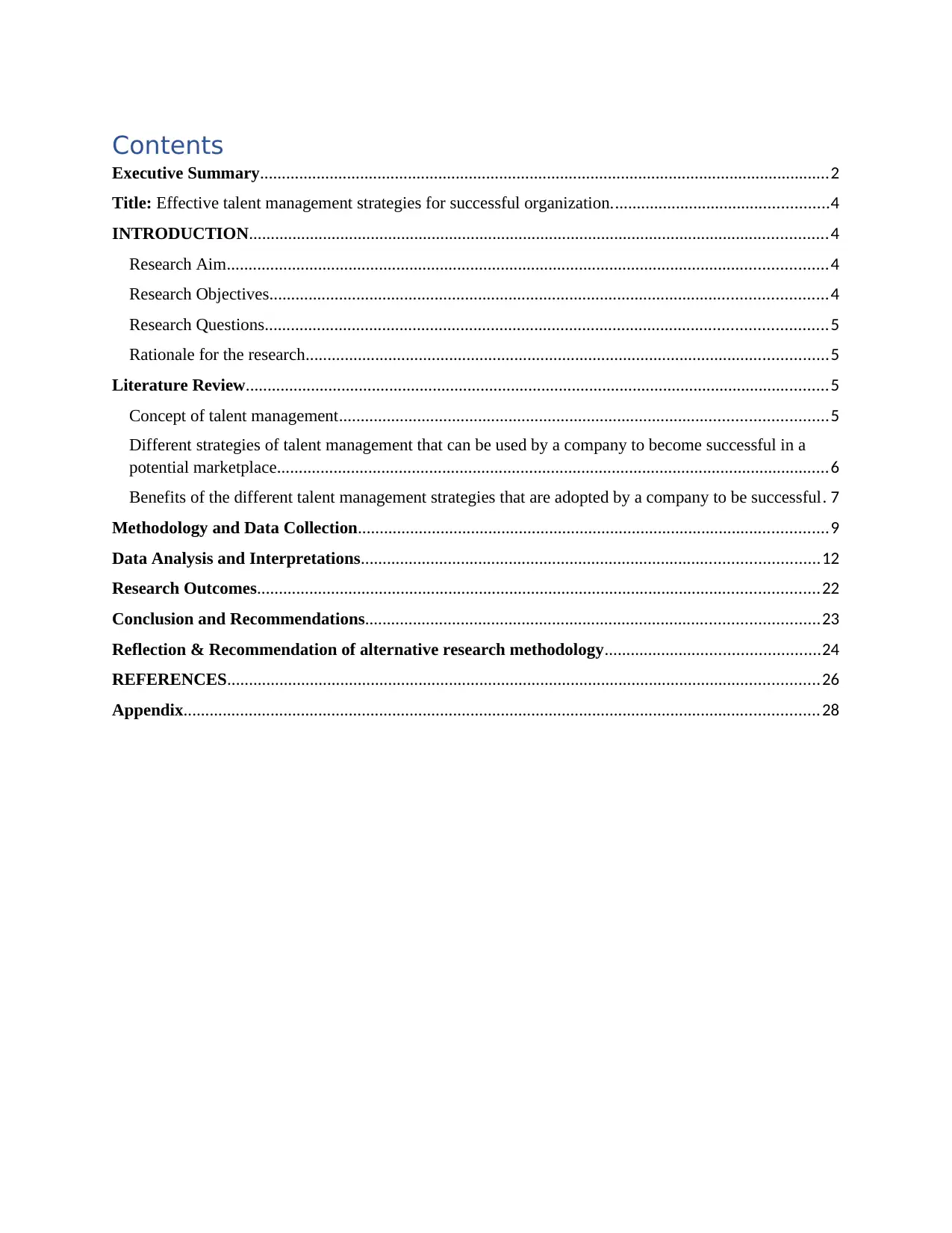
Contents
Executive Summary...................................................................................................................................2
Title: Effective talent management strategies for successful organization..................................................4
INTRODUCTION.....................................................................................................................................4
Research Aim..........................................................................................................................................4
Research Objectives................................................................................................................................4
Research Questions.................................................................................................................................5
Rationale for the research........................................................................................................................5
Literature Review......................................................................................................................................5
Concept of talent management................................................................................................................5
Different strategies of talent management that can be used by a company to become successful in a
potential marketplace...............................................................................................................................6
Benefits of the different talent management strategies that are adopted by a company to be successful. 7
Methodology and Data Collection............................................................................................................9
Data Analysis and Interpretations.........................................................................................................12
Research Outcomes.................................................................................................................................22
Conclusion and Recommendations........................................................................................................23
Reflection & Recommendation of alternative research methodology.................................................24
REFERENCES........................................................................................................................................26
Appendix..................................................................................................................................................28
Executive Summary...................................................................................................................................2
Title: Effective talent management strategies for successful organization..................................................4
INTRODUCTION.....................................................................................................................................4
Research Aim..........................................................................................................................................4
Research Objectives................................................................................................................................4
Research Questions.................................................................................................................................5
Rationale for the research........................................................................................................................5
Literature Review......................................................................................................................................5
Concept of talent management................................................................................................................5
Different strategies of talent management that can be used by a company to become successful in a
potential marketplace...............................................................................................................................6
Benefits of the different talent management strategies that are adopted by a company to be successful. 7
Methodology and Data Collection............................................................................................................9
Data Analysis and Interpretations.........................................................................................................12
Research Outcomes.................................................................................................................................22
Conclusion and Recommendations........................................................................................................23
Reflection & Recommendation of alternative research methodology.................................................24
REFERENCES........................................................................................................................................26
Appendix..................................................................................................................................................28
⊘ This is a preview!⊘
Do you want full access?
Subscribe today to unlock all pages.

Trusted by 1+ million students worldwide
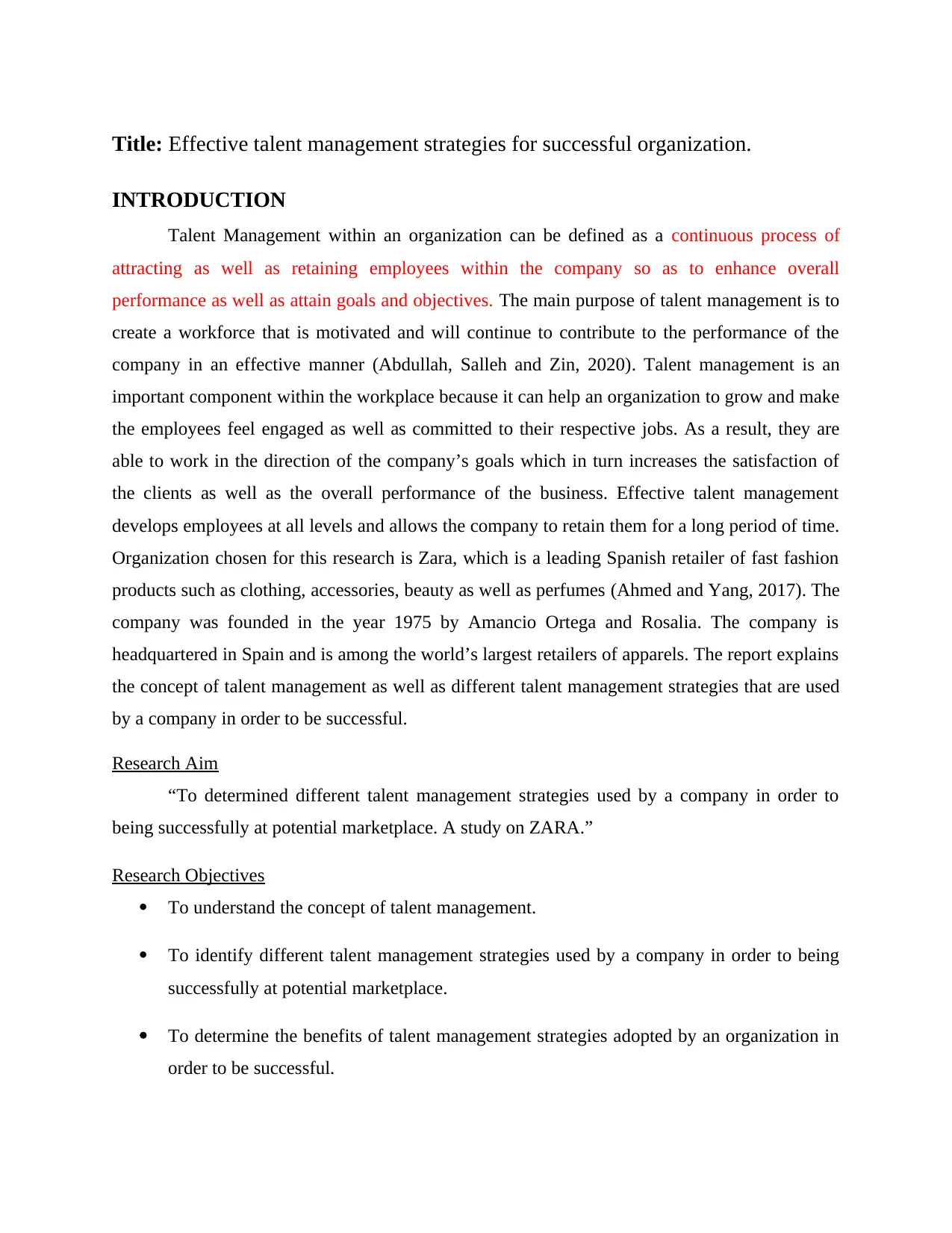
Title: Effective talent management strategies for successful organization.
INTRODUCTION
Talent Management within an organization can be defined as a continuous process of
attracting as well as retaining employees within the company so as to enhance overall
performance as well as attain goals and objectives. The main purpose of talent management is to
create a workforce that is motivated and will continue to contribute to the performance of the
company in an effective manner (Abdullah, Salleh and Zin, 2020). Talent management is an
important component within the workplace because it can help an organization to grow and make
the employees feel engaged as well as committed to their respective jobs. As a result, they are
able to work in the direction of the company’s goals which in turn increases the satisfaction of
the clients as well as the overall performance of the business. Effective talent management
develops employees at all levels and allows the company to retain them for a long period of time.
Organization chosen for this research is Zara, which is a leading Spanish retailer of fast fashion
products such as clothing, accessories, beauty as well as perfumes (Ahmed and Yang, 2017). The
company was founded in the year 1975 by Amancio Ortega and Rosalia. The company is
headquartered in Spain and is among the world’s largest retailers of apparels. The report explains
the concept of talent management as well as different talent management strategies that are used
by a company in order to be successful.
Research Aim
“To determined different talent management strategies used by a company in order to
being successfully at potential marketplace. A study on ZARA.”
Research Objectives
To understand the concept of talent management.
To identify different talent management strategies used by a company in order to being
successfully at potential marketplace.
To determine the benefits of talent management strategies adopted by an organization in
order to be successful.
INTRODUCTION
Talent Management within an organization can be defined as a continuous process of
attracting as well as retaining employees within the company so as to enhance overall
performance as well as attain goals and objectives. The main purpose of talent management is to
create a workforce that is motivated and will continue to contribute to the performance of the
company in an effective manner (Abdullah, Salleh and Zin, 2020). Talent management is an
important component within the workplace because it can help an organization to grow and make
the employees feel engaged as well as committed to their respective jobs. As a result, they are
able to work in the direction of the company’s goals which in turn increases the satisfaction of
the clients as well as the overall performance of the business. Effective talent management
develops employees at all levels and allows the company to retain them for a long period of time.
Organization chosen for this research is Zara, which is a leading Spanish retailer of fast fashion
products such as clothing, accessories, beauty as well as perfumes (Ahmed and Yang, 2017). The
company was founded in the year 1975 by Amancio Ortega and Rosalia. The company is
headquartered in Spain and is among the world’s largest retailers of apparels. The report explains
the concept of talent management as well as different talent management strategies that are used
by a company in order to be successful.
Research Aim
“To determined different talent management strategies used by a company in order to
being successfully at potential marketplace. A study on ZARA.”
Research Objectives
To understand the concept of talent management.
To identify different talent management strategies used by a company in order to being
successfully at potential marketplace.
To determine the benefits of talent management strategies adopted by an organization in
order to be successful.
Paraphrase This Document
Need a fresh take? Get an instant paraphrase of this document with our AI Paraphraser
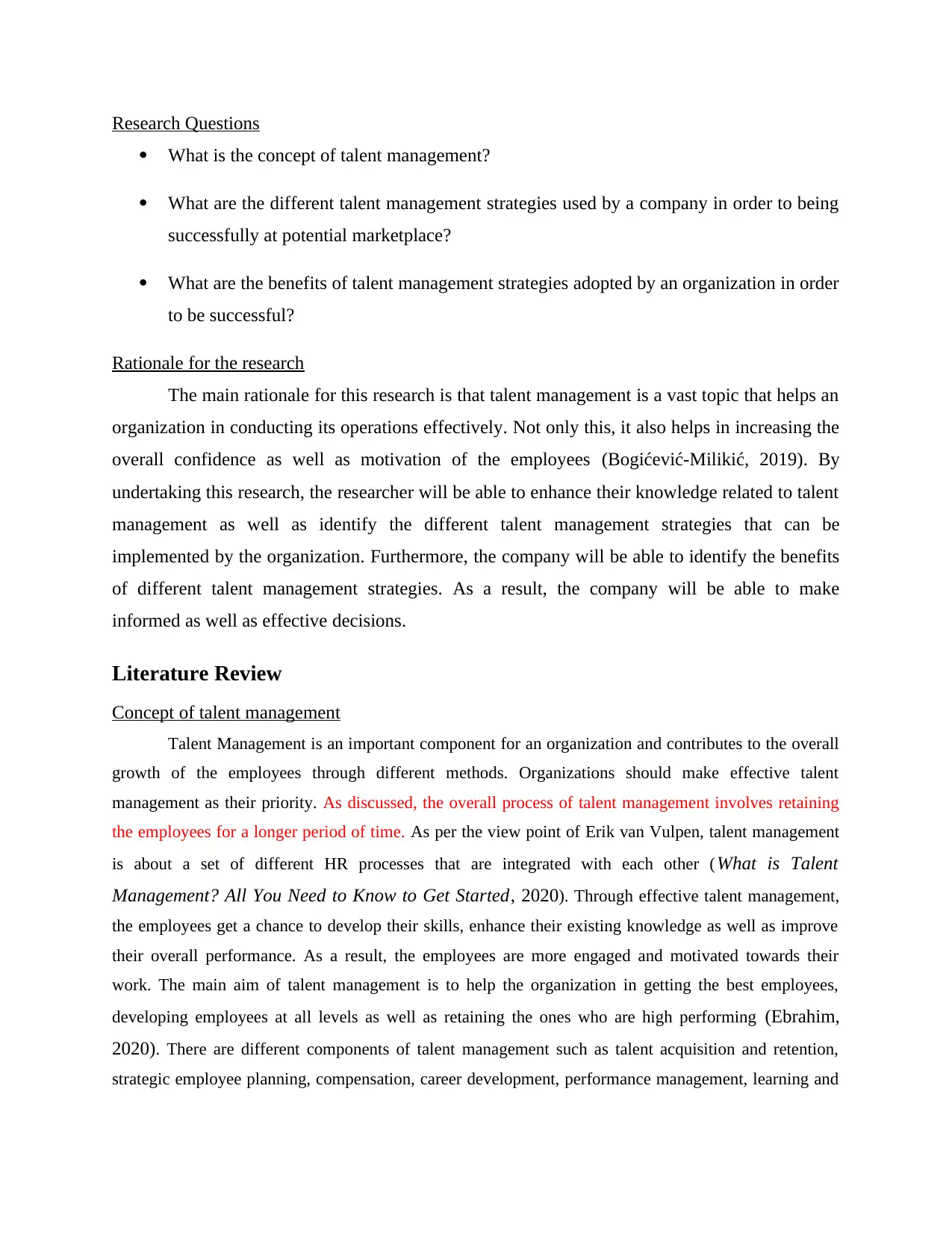
Research Questions
What is the concept of talent management?
What are the different talent management strategies used by a company in order to being
successfully at potential marketplace?
What are the benefits of talent management strategies adopted by an organization in order
to be successful?
Rationale for the research
The main rationale for this research is that talent management is a vast topic that helps an
organization in conducting its operations effectively. Not only this, it also helps in increasing the
overall confidence as well as motivation of the employees (Bogićević-Milikić, 2019). By
undertaking this research, the researcher will be able to enhance their knowledge related to talent
management as well as identify the different talent management strategies that can be
implemented by the organization. Furthermore, the company will be able to identify the benefits
of different talent management strategies. As a result, the company will be able to make
informed as well as effective decisions.
Literature Review
Concept of talent management
Talent Management is an important component for an organization and contributes to the overall
growth of the employees through different methods. Organizations should make effective talent
management as their priority. As discussed, the overall process of talent management involves retaining
the employees for a longer period of time. As per the view point of Erik van Vulpen, talent management
is about a set of different HR processes that are integrated with each other (What is Talent
Management? All You Need to Know to Get Started, 2020). Through effective talent management,
the employees get a chance to develop their skills, enhance their existing knowledge as well as improve
their overall performance. As a result, the employees are more engaged and motivated towards their
work. The main aim of talent management is to help the organization in getting the best employees,
developing employees at all levels as well as retaining the ones who are high performing (Ebrahim,
2020). There are different components of talent management such as talent acquisition and retention,
strategic employee planning, compensation, career development, performance management, learning and
What is the concept of talent management?
What are the different talent management strategies used by a company in order to being
successfully at potential marketplace?
What are the benefits of talent management strategies adopted by an organization in order
to be successful?
Rationale for the research
The main rationale for this research is that talent management is a vast topic that helps an
organization in conducting its operations effectively. Not only this, it also helps in increasing the
overall confidence as well as motivation of the employees (Bogićević-Milikić, 2019). By
undertaking this research, the researcher will be able to enhance their knowledge related to talent
management as well as identify the different talent management strategies that can be
implemented by the organization. Furthermore, the company will be able to identify the benefits
of different talent management strategies. As a result, the company will be able to make
informed as well as effective decisions.
Literature Review
Concept of talent management
Talent Management is an important component for an organization and contributes to the overall
growth of the employees through different methods. Organizations should make effective talent
management as their priority. As discussed, the overall process of talent management involves retaining
the employees for a longer period of time. As per the view point of Erik van Vulpen, talent management
is about a set of different HR processes that are integrated with each other (What is Talent
Management? All You Need to Know to Get Started, 2020). Through effective talent management,
the employees get a chance to develop their skills, enhance their existing knowledge as well as improve
their overall performance. As a result, the employees are more engaged and motivated towards their
work. The main aim of talent management is to help the organization in getting the best employees,
developing employees at all levels as well as retaining the ones who are high performing (Ebrahim,
2020). There are different components of talent management such as talent acquisition and retention,
strategic employee planning, compensation, career development, performance management, learning and
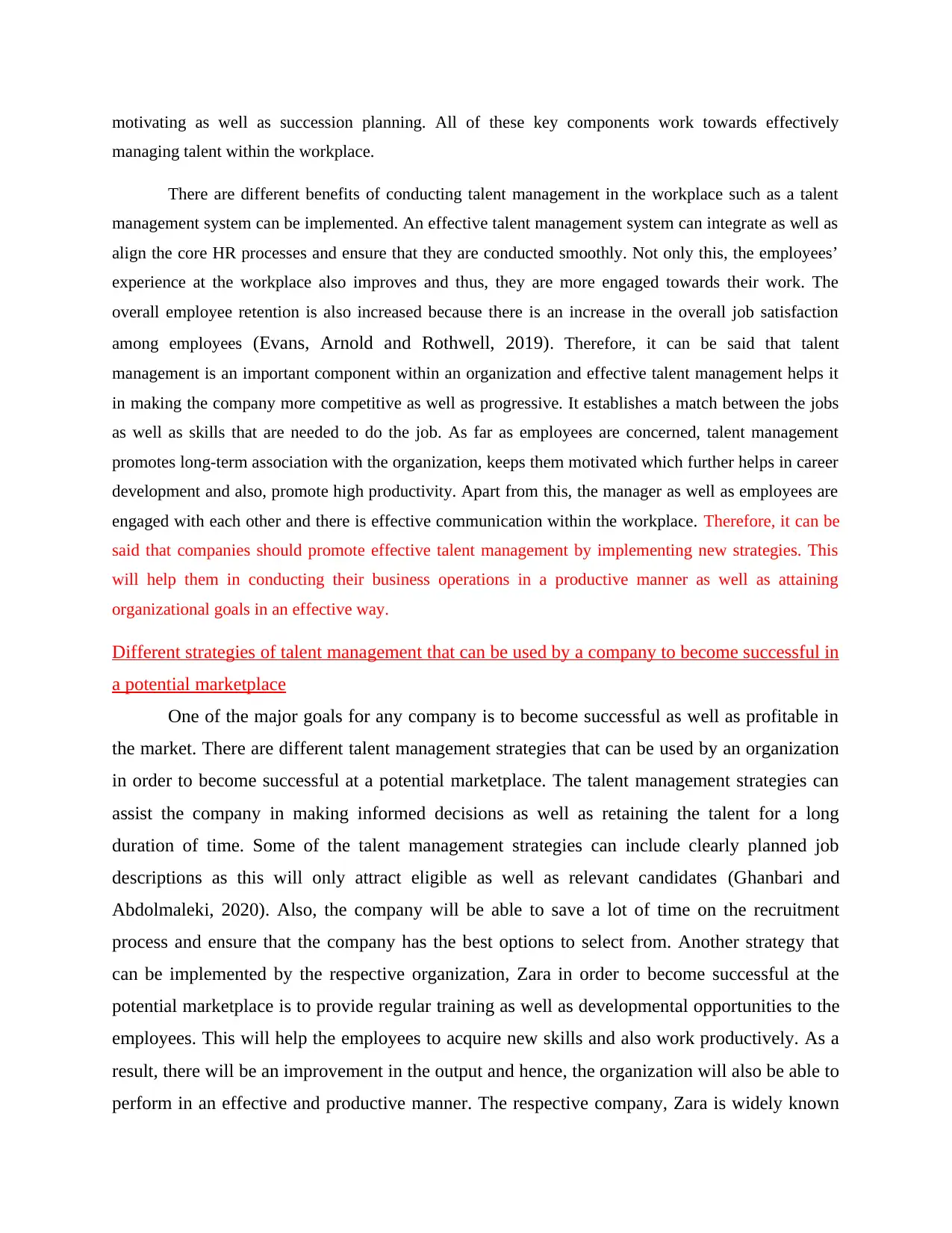
motivating as well as succession planning. All of these key components work towards effectively
managing talent within the workplace.
There are different benefits of conducting talent management in the workplace such as a talent
management system can be implemented. An effective talent management system can integrate as well as
align the core HR processes and ensure that they are conducted smoothly. Not only this, the employees’
experience at the workplace also improves and thus, they are more engaged towards their work. The
overall employee retention is also increased because there is an increase in the overall job satisfaction
among employees (Evans, Arnold and Rothwell, 2019). Therefore, it can be said that talent
management is an important component within an organization and effective talent management helps it
in making the company more competitive as well as progressive. It establishes a match between the jobs
as well as skills that are needed to do the job. As far as employees are concerned, talent management
promotes long-term association with the organization, keeps them motivated which further helps in career
development and also, promote high productivity. Apart from this, the manager as well as employees are
engaged with each other and there is effective communication within the workplace. Therefore, it can be
said that companies should promote effective talent management by implementing new strategies. This
will help them in conducting their business operations in a productive manner as well as attaining
organizational goals in an effective way.
Different strategies of talent management that can be used by a company to become successful in
a potential marketplace
One of the major goals for any company is to become successful as well as profitable in
the market. There are different talent management strategies that can be used by an organization
in order to become successful at a potential marketplace. The talent management strategies can
assist the company in making informed decisions as well as retaining the talent for a long
duration of time. Some of the talent management strategies can include clearly planned job
descriptions as this will only attract eligible as well as relevant candidates (Ghanbari and
Abdolmaleki, 2020). Also, the company will be able to save a lot of time on the recruitment
process and ensure that the company has the best options to select from. Another strategy that
can be implemented by the respective organization, Zara in order to become successful at the
potential marketplace is to provide regular training as well as developmental opportunities to the
employees. This will help the employees to acquire new skills and also work productively. As a
result, there will be an improvement in the output and hence, the organization will also be able to
perform in an effective and productive manner. The respective company, Zara is widely known
managing talent within the workplace.
There are different benefits of conducting talent management in the workplace such as a talent
management system can be implemented. An effective talent management system can integrate as well as
align the core HR processes and ensure that they are conducted smoothly. Not only this, the employees’
experience at the workplace also improves and thus, they are more engaged towards their work. The
overall employee retention is also increased because there is an increase in the overall job satisfaction
among employees (Evans, Arnold and Rothwell, 2019). Therefore, it can be said that talent
management is an important component within an organization and effective talent management helps it
in making the company more competitive as well as progressive. It establishes a match between the jobs
as well as skills that are needed to do the job. As far as employees are concerned, talent management
promotes long-term association with the organization, keeps them motivated which further helps in career
development and also, promote high productivity. Apart from this, the manager as well as employees are
engaged with each other and there is effective communication within the workplace. Therefore, it can be
said that companies should promote effective talent management by implementing new strategies. This
will help them in conducting their business operations in a productive manner as well as attaining
organizational goals in an effective way.
Different strategies of talent management that can be used by a company to become successful in
a potential marketplace
One of the major goals for any company is to become successful as well as profitable in
the market. There are different talent management strategies that can be used by an organization
in order to become successful at a potential marketplace. The talent management strategies can
assist the company in making informed decisions as well as retaining the talent for a long
duration of time. Some of the talent management strategies can include clearly planned job
descriptions as this will only attract eligible as well as relevant candidates (Ghanbari and
Abdolmaleki, 2020). Also, the company will be able to save a lot of time on the recruitment
process and ensure that the company has the best options to select from. Another strategy that
can be implemented by the respective organization, Zara in order to become successful at the
potential marketplace is to provide regular training as well as developmental opportunities to the
employees. This will help the employees to acquire new skills and also work productively. As a
result, there will be an improvement in the output and hence, the organization will also be able to
perform in an effective and productive manner. The respective company, Zara is widely known
⊘ This is a preview!⊘
Do you want full access?
Subscribe today to unlock all pages.

Trusted by 1+ million students worldwide
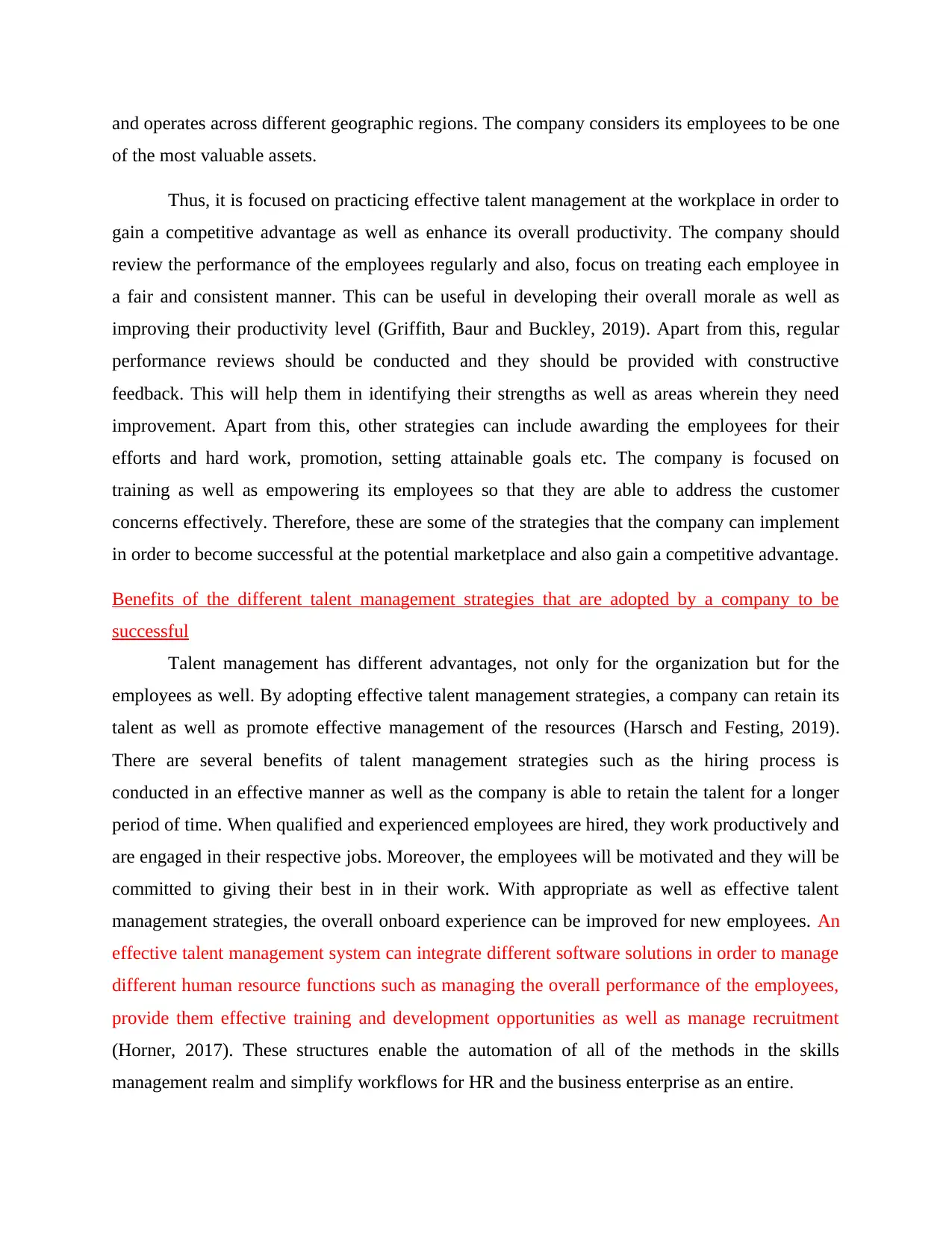
and operates across different geographic regions. The company considers its employees to be one
of the most valuable assets.
Thus, it is focused on practicing effective talent management at the workplace in order to
gain a competitive advantage as well as enhance its overall productivity. The company should
review the performance of the employees regularly and also, focus on treating each employee in
a fair and consistent manner. This can be useful in developing their overall morale as well as
improving their productivity level (Griffith, Baur and Buckley, 2019). Apart from this, regular
performance reviews should be conducted and they should be provided with constructive
feedback. This will help them in identifying their strengths as well as areas wherein they need
improvement. Apart from this, other strategies can include awarding the employees for their
efforts and hard work, promotion, setting attainable goals etc. The company is focused on
training as well as empowering its employees so that they are able to address the customer
concerns effectively. Therefore, these are some of the strategies that the company can implement
in order to become successful at the potential marketplace and also gain a competitive advantage.
Benefits of the different talent management strategies that are adopted by a company to be
successful
Talent management has different advantages, not only for the organization but for the
employees as well. By adopting effective talent management strategies, a company can retain its
talent as well as promote effective management of the resources (Harsch and Festing, 2019).
There are several benefits of talent management strategies such as the hiring process is
conducted in an effective manner as well as the company is able to retain the talent for a longer
period of time. When qualified and experienced employees are hired, they work productively and
are engaged in their respective jobs. Moreover, the employees will be motivated and they will be
committed to giving their best in in their work. With appropriate as well as effective talent
management strategies, the overall onboard experience can be improved for new employees. An
effective talent management system can integrate different software solutions in order to manage
different human resource functions such as managing the overall performance of the employees,
provide them effective training and development opportunities as well as manage recruitment
(Horner, 2017). These structures enable the automation of all of the methods in the skills
management realm and simplify workflows for HR and the business enterprise as an entire.
of the most valuable assets.
Thus, it is focused on practicing effective talent management at the workplace in order to
gain a competitive advantage as well as enhance its overall productivity. The company should
review the performance of the employees regularly and also, focus on treating each employee in
a fair and consistent manner. This can be useful in developing their overall morale as well as
improving their productivity level (Griffith, Baur and Buckley, 2019). Apart from this, regular
performance reviews should be conducted and they should be provided with constructive
feedback. This will help them in identifying their strengths as well as areas wherein they need
improvement. Apart from this, other strategies can include awarding the employees for their
efforts and hard work, promotion, setting attainable goals etc. The company is focused on
training as well as empowering its employees so that they are able to address the customer
concerns effectively. Therefore, these are some of the strategies that the company can implement
in order to become successful at the potential marketplace and also gain a competitive advantage.
Benefits of the different talent management strategies that are adopted by a company to be
successful
Talent management has different advantages, not only for the organization but for the
employees as well. By adopting effective talent management strategies, a company can retain its
talent as well as promote effective management of the resources (Harsch and Festing, 2019).
There are several benefits of talent management strategies such as the hiring process is
conducted in an effective manner as well as the company is able to retain the talent for a longer
period of time. When qualified and experienced employees are hired, they work productively and
are engaged in their respective jobs. Moreover, the employees will be motivated and they will be
committed to giving their best in in their work. With appropriate as well as effective talent
management strategies, the overall onboard experience can be improved for new employees. An
effective talent management system can integrate different software solutions in order to manage
different human resource functions such as managing the overall performance of the employees,
provide them effective training and development opportunities as well as manage recruitment
(Horner, 2017). These structures enable the automation of all of the methods in the skills
management realm and simplify workflows for HR and the business enterprise as an entire.
Paraphrase This Document
Need a fresh take? Get an instant paraphrase of this document with our AI Paraphraser
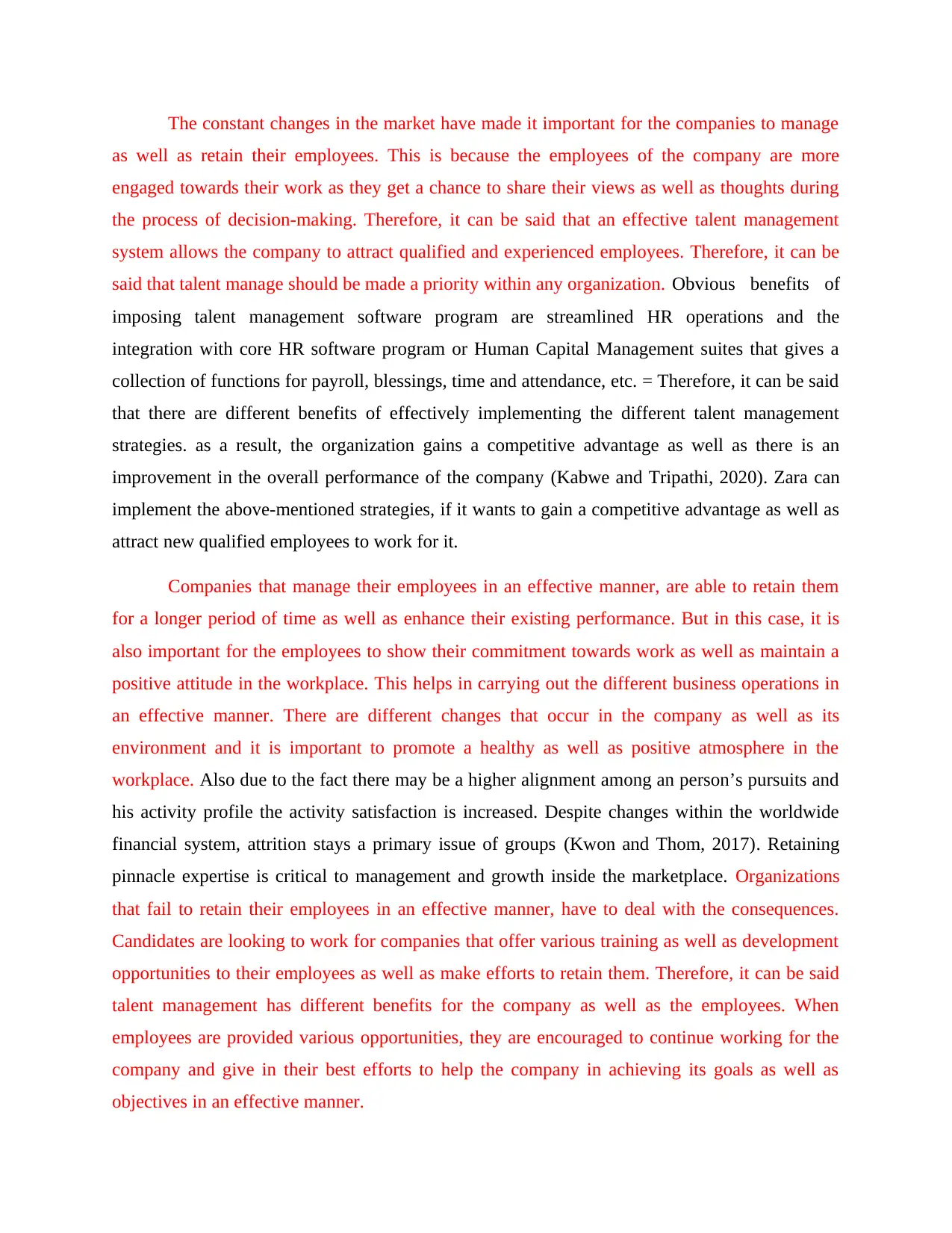
The constant changes in the market have made it important for the companies to manage
as well as retain their employees. This is because the employees of the company are more
engaged towards their work as they get a chance to share their views as well as thoughts during
the process of decision-making. Therefore, it can be said that an effective talent management
system allows the company to attract qualified and experienced employees. Therefore, it can be
said that talent manage should be made a priority within any organization. Obvious benefits of
imposing talent management software program are streamlined HR operations and the
integration with core HR software program or Human Capital Management suites that gives a
collection of functions for payroll, blessings, time and attendance, etc. = Therefore, it can be said
that there are different benefits of effectively implementing the different talent management
strategies. as a result, the organization gains a competitive advantage as well as there is an
improvement in the overall performance of the company (Kabwe and Tripathi, 2020). Zara can
implement the above-mentioned strategies, if it wants to gain a competitive advantage as well as
attract new qualified employees to work for it.
Companies that manage their employees in an effective manner, are able to retain them
for a longer period of time as well as enhance their existing performance. But in this case, it is
also important for the employees to show their commitment towards work as well as maintain a
positive attitude in the workplace. This helps in carrying out the different business operations in
an effective manner. There are different changes that occur in the company as well as its
environment and it is important to promote a healthy as well as positive atmosphere in the
workplace. Also due to the fact there may be a higher alignment among an person’s pursuits and
his activity profile the activity satisfaction is increased. Despite changes within the worldwide
financial system, attrition stays a primary issue of groups (Kwon and Thom, 2017). Retaining
pinnacle expertise is critical to management and growth inside the marketplace. Organizations
that fail to retain their employees in an effective manner, have to deal with the consequences.
Candidates are looking to work for companies that offer various training as well as development
opportunities to their employees as well as make efforts to retain them. Therefore, it can be said
talent management has different benefits for the company as well as the employees. When
employees are provided various opportunities, they are encouraged to continue working for the
company and give in their best efforts to help the company in achieving its goals as well as
objectives in an effective manner.
as well as retain their employees. This is because the employees of the company are more
engaged towards their work as they get a chance to share their views as well as thoughts during
the process of decision-making. Therefore, it can be said that an effective talent management
system allows the company to attract qualified and experienced employees. Therefore, it can be
said that talent manage should be made a priority within any organization. Obvious benefits of
imposing talent management software program are streamlined HR operations and the
integration with core HR software program or Human Capital Management suites that gives a
collection of functions for payroll, blessings, time and attendance, etc. = Therefore, it can be said
that there are different benefits of effectively implementing the different talent management
strategies. as a result, the organization gains a competitive advantage as well as there is an
improvement in the overall performance of the company (Kabwe and Tripathi, 2020). Zara can
implement the above-mentioned strategies, if it wants to gain a competitive advantage as well as
attract new qualified employees to work for it.
Companies that manage their employees in an effective manner, are able to retain them
for a longer period of time as well as enhance their existing performance. But in this case, it is
also important for the employees to show their commitment towards work as well as maintain a
positive attitude in the workplace. This helps in carrying out the different business operations in
an effective manner. There are different changes that occur in the company as well as its
environment and it is important to promote a healthy as well as positive atmosphere in the
workplace. Also due to the fact there may be a higher alignment among an person’s pursuits and
his activity profile the activity satisfaction is increased. Despite changes within the worldwide
financial system, attrition stays a primary issue of groups (Kwon and Thom, 2017). Retaining
pinnacle expertise is critical to management and growth inside the marketplace. Organizations
that fail to retain their employees in an effective manner, have to deal with the consequences.
Candidates are looking to work for companies that offer various training as well as development
opportunities to their employees as well as make efforts to retain them. Therefore, it can be said
talent management has different benefits for the company as well as the employees. When
employees are provided various opportunities, they are encouraged to continue working for the
company and give in their best efforts to help the company in achieving its goals as well as
objectives in an effective manner.
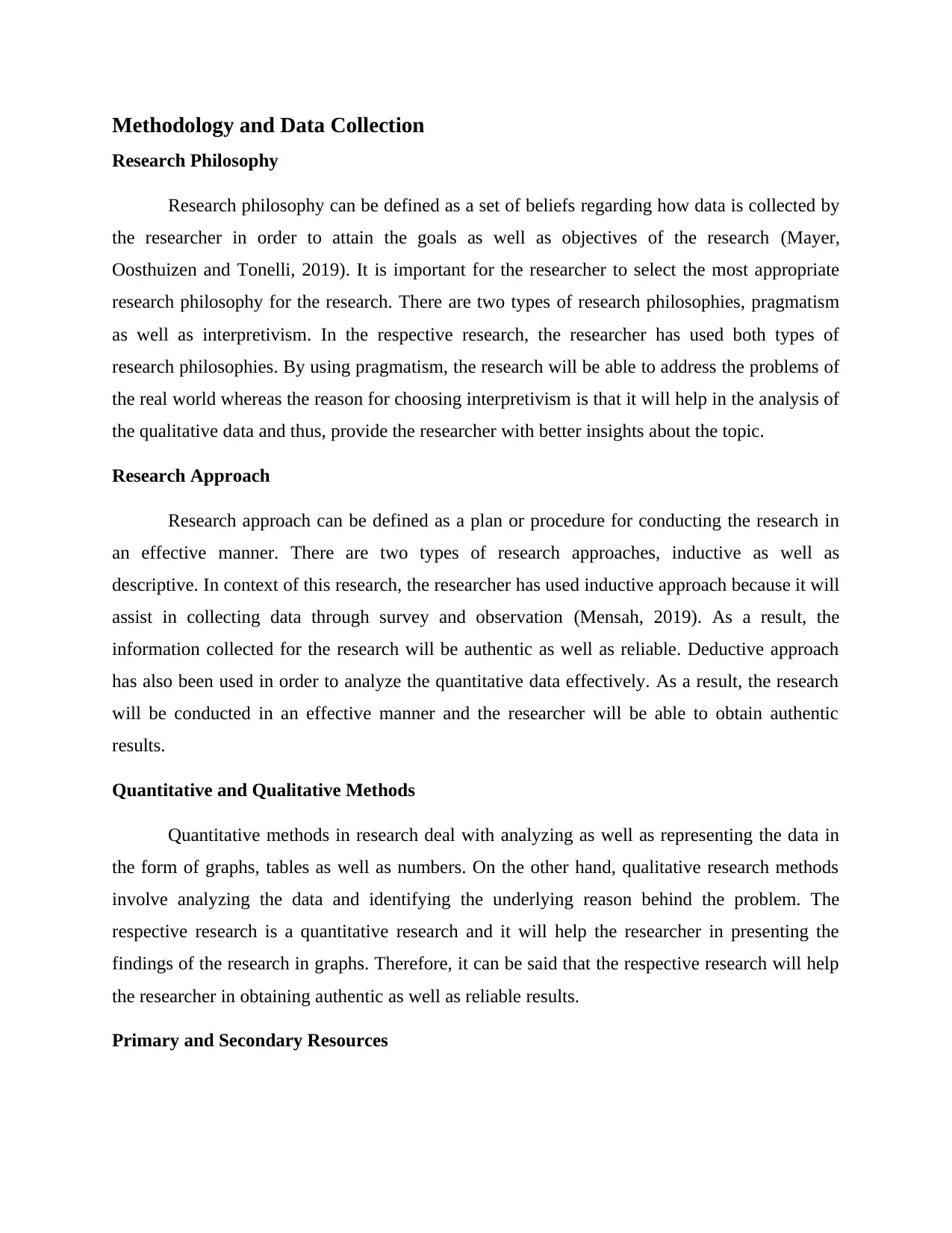
Methodology and Data Collection
Research Philosophy
Research philosophy can be defined as a set of beliefs regarding how data is collected by
the researcher in order to attain the goals as well as objectives of the research (Mayer,
Oosthuizen and Tonelli, 2019). It is important for the researcher to select the most appropriate
research philosophy for the research. There are two types of research philosophies, pragmatism
as well as interpretivism. In the respective research, the researcher has used both types of
research philosophies. By using pragmatism, the research will be able to address the problems of
the real world whereas the reason for choosing interpretivism is that it will help in the analysis of
the qualitative data and thus, provide the researcher with better insights about the topic.
Research Approach
Research approach can be defined as a plan or procedure for conducting the research in
an effective manner. There are two types of research approaches, inductive as well as
descriptive. In context of this research, the researcher has used inductive approach because it will
assist in collecting data through survey and observation (Mensah, 2019). As a result, the
information collected for the research will be authentic as well as reliable. Deductive approach
has also been used in order to analyze the quantitative data effectively. As a result, the research
will be conducted in an effective manner and the researcher will be able to obtain authentic
results.
Quantitative and Qualitative Methods
Quantitative methods in research deal with analyzing as well as representing the data in
the form of graphs, tables as well as numbers. On the other hand, qualitative research methods
involve analyzing the data and identifying the underlying reason behind the problem. The
respective research is a quantitative research and it will help the researcher in presenting the
findings of the research in graphs. Therefore, it can be said that the respective research will help
the researcher in obtaining authentic as well as reliable results.
Primary and Secondary Resources
Research Philosophy
Research philosophy can be defined as a set of beliefs regarding how data is collected by
the researcher in order to attain the goals as well as objectives of the research (Mayer,
Oosthuizen and Tonelli, 2019). It is important for the researcher to select the most appropriate
research philosophy for the research. There are two types of research philosophies, pragmatism
as well as interpretivism. In the respective research, the researcher has used both types of
research philosophies. By using pragmatism, the research will be able to address the problems of
the real world whereas the reason for choosing interpretivism is that it will help in the analysis of
the qualitative data and thus, provide the researcher with better insights about the topic.
Research Approach
Research approach can be defined as a plan or procedure for conducting the research in
an effective manner. There are two types of research approaches, inductive as well as
descriptive. In context of this research, the researcher has used inductive approach because it will
assist in collecting data through survey and observation (Mensah, 2019). As a result, the
information collected for the research will be authentic as well as reliable. Deductive approach
has also been used in order to analyze the quantitative data effectively. As a result, the research
will be conducted in an effective manner and the researcher will be able to obtain authentic
results.
Quantitative and Qualitative Methods
Quantitative methods in research deal with analyzing as well as representing the data in
the form of graphs, tables as well as numbers. On the other hand, qualitative research methods
involve analyzing the data and identifying the underlying reason behind the problem. The
respective research is a quantitative research and it will help the researcher in presenting the
findings of the research in graphs. Therefore, it can be said that the respective research will help
the researcher in obtaining authentic as well as reliable results.
Primary and Secondary Resources
⊘ This is a preview!⊘
Do you want full access?
Subscribe today to unlock all pages.

Trusted by 1+ million students worldwide
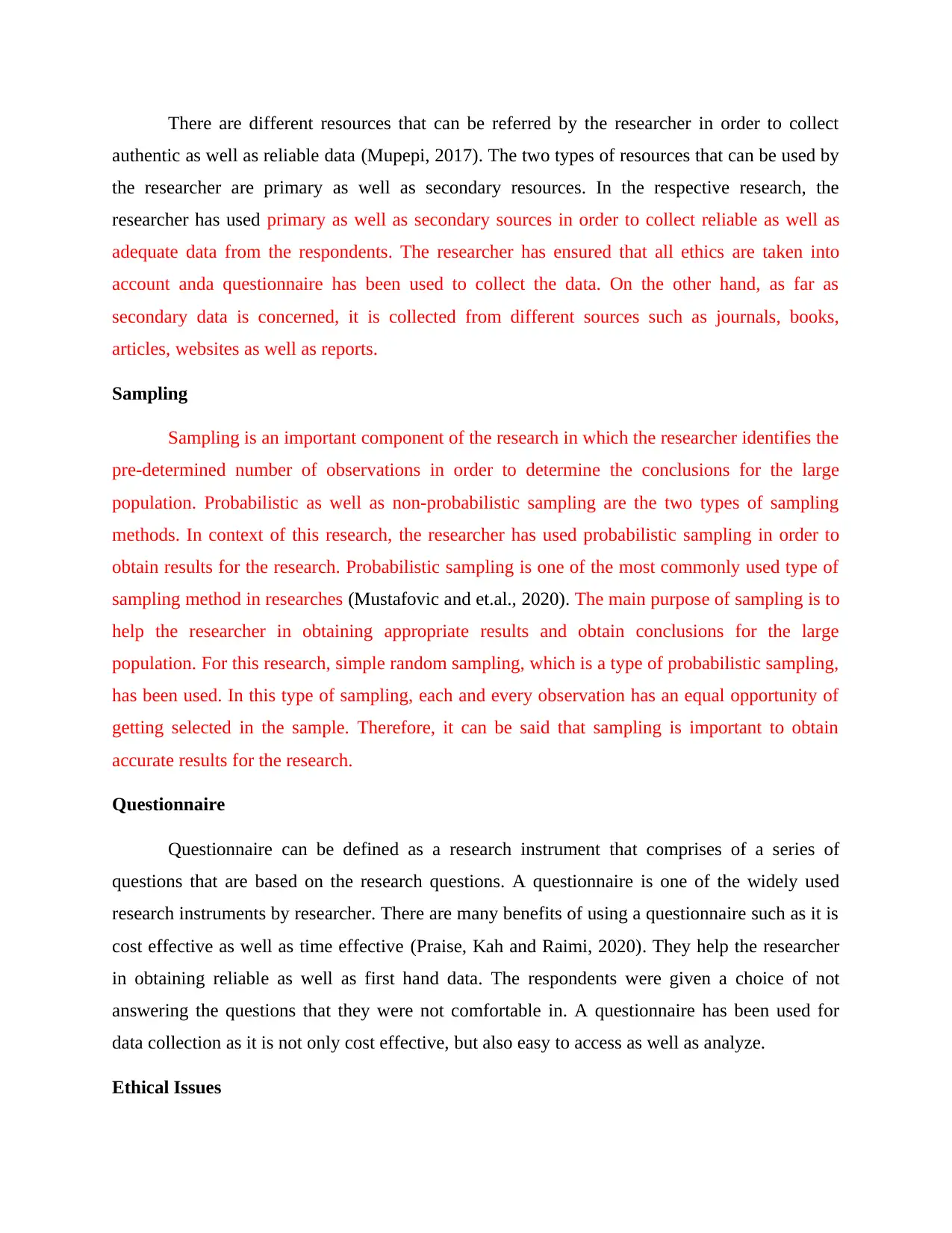
There are different resources that can be referred by the researcher in order to collect
authentic as well as reliable data (Mupepi, 2017). The two types of resources that can be used by
the researcher are primary as well as secondary resources. In the respective research, the
researcher has used primary as well as secondary sources in order to collect reliable as well as
adequate data from the respondents. The researcher has ensured that all ethics are taken into
account anda questionnaire has been used to collect the data. On the other hand, as far as
secondary data is concerned, it is collected from different sources such as journals, books,
articles, websites as well as reports.
Sampling
Sampling is an important component of the research in which the researcher identifies the
pre-determined number of observations in order to determine the conclusions for the large
population. Probabilistic as well as non-probabilistic sampling are the two types of sampling
methods. In context of this research, the researcher has used probabilistic sampling in order to
obtain results for the research. Probabilistic sampling is one of the most commonly used type of
sampling method in researches (Mustafovic and et.al., 2020). The main purpose of sampling is to
help the researcher in obtaining appropriate results and obtain conclusions for the large
population. For this research, simple random sampling, which is a type of probabilistic sampling,
has been used. In this type of sampling, each and every observation has an equal opportunity of
getting selected in the sample. Therefore, it can be said that sampling is important to obtain
accurate results for the research.
Questionnaire
Questionnaire can be defined as a research instrument that comprises of a series of
questions that are based on the research questions. A questionnaire is one of the widely used
research instruments by researcher. There are many benefits of using a questionnaire such as it is
cost effective as well as time effective (Praise, Kah and Raimi, 2020). They help the researcher
in obtaining reliable as well as first hand data. The respondents were given a choice of not
answering the questions that they were not comfortable in. A questionnaire has been used for
data collection as it is not only cost effective, but also easy to access as well as analyze.
Ethical Issues
authentic as well as reliable data (Mupepi, 2017). The two types of resources that can be used by
the researcher are primary as well as secondary resources. In the respective research, the
researcher has used primary as well as secondary sources in order to collect reliable as well as
adequate data from the respondents. The researcher has ensured that all ethics are taken into
account anda questionnaire has been used to collect the data. On the other hand, as far as
secondary data is concerned, it is collected from different sources such as journals, books,
articles, websites as well as reports.
Sampling
Sampling is an important component of the research in which the researcher identifies the
pre-determined number of observations in order to determine the conclusions for the large
population. Probabilistic as well as non-probabilistic sampling are the two types of sampling
methods. In context of this research, the researcher has used probabilistic sampling in order to
obtain results for the research. Probabilistic sampling is one of the most commonly used type of
sampling method in researches (Mustafovic and et.al., 2020). The main purpose of sampling is to
help the researcher in obtaining appropriate results and obtain conclusions for the large
population. For this research, simple random sampling, which is a type of probabilistic sampling,
has been used. In this type of sampling, each and every observation has an equal opportunity of
getting selected in the sample. Therefore, it can be said that sampling is important to obtain
accurate results for the research.
Questionnaire
Questionnaire can be defined as a research instrument that comprises of a series of
questions that are based on the research questions. A questionnaire is one of the widely used
research instruments by researcher. There are many benefits of using a questionnaire such as it is
cost effective as well as time effective (Praise, Kah and Raimi, 2020). They help the researcher
in obtaining reliable as well as first hand data. The respondents were given a choice of not
answering the questions that they were not comfortable in. A questionnaire has been used for
data collection as it is not only cost effective, but also easy to access as well as analyze.
Ethical Issues
Paraphrase This Document
Need a fresh take? Get an instant paraphrase of this document with our AI Paraphraser
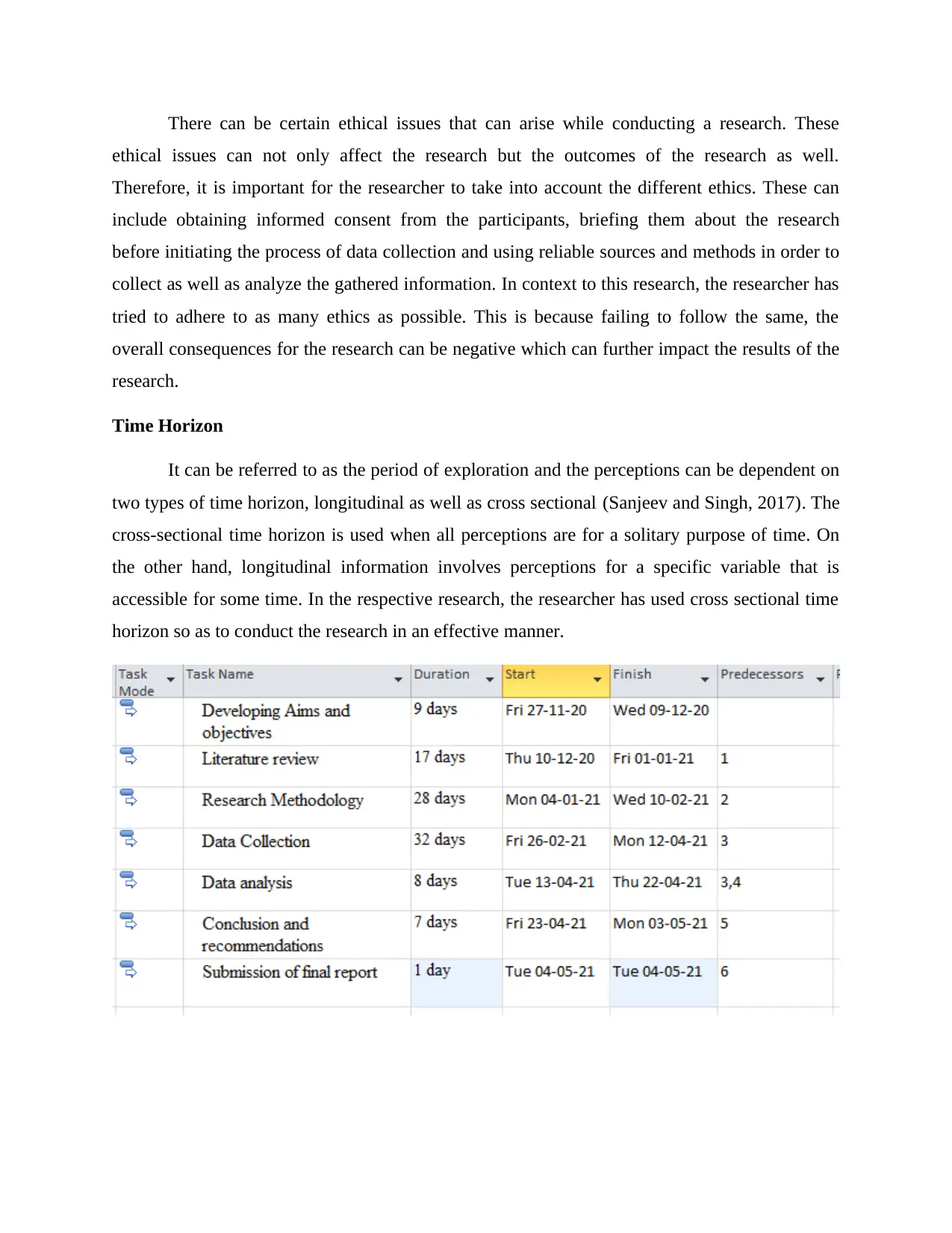
There can be certain ethical issues that can arise while conducting a research. These
ethical issues can not only affect the research but the outcomes of the research as well.
Therefore, it is important for the researcher to take into account the different ethics. These can
include obtaining informed consent from the participants, briefing them about the research
before initiating the process of data collection and using reliable sources and methods in order to
collect as well as analyze the gathered information. In context to this research, the researcher has
tried to adhere to as many ethics as possible. This is because failing to follow the same, the
overall consequences for the research can be negative which can further impact the results of the
research.
Time Horizon
It can be referred to as the period of exploration and the perceptions can be dependent on
two types of time horizon, longitudinal as well as cross sectional (Sanjeev and Singh, 2017). The
cross-sectional time horizon is used when all perceptions are for a solitary purpose of time. On
the other hand, longitudinal information involves perceptions for a specific variable that is
accessible for some time. In the respective research, the researcher has used cross sectional time
horizon so as to conduct the research in an effective manner.
ethical issues can not only affect the research but the outcomes of the research as well.
Therefore, it is important for the researcher to take into account the different ethics. These can
include obtaining informed consent from the participants, briefing them about the research
before initiating the process of data collection and using reliable sources and methods in order to
collect as well as analyze the gathered information. In context to this research, the researcher has
tried to adhere to as many ethics as possible. This is because failing to follow the same, the
overall consequences for the research can be negative which can further impact the results of the
research.
Time Horizon
It can be referred to as the period of exploration and the perceptions can be dependent on
two types of time horizon, longitudinal as well as cross sectional (Sanjeev and Singh, 2017). The
cross-sectional time horizon is used when all perceptions are for a solitary purpose of time. On
the other hand, longitudinal information involves perceptions for a specific variable that is
accessible for some time. In the respective research, the researcher has used cross sectional time
horizon so as to conduct the research in an effective manner.
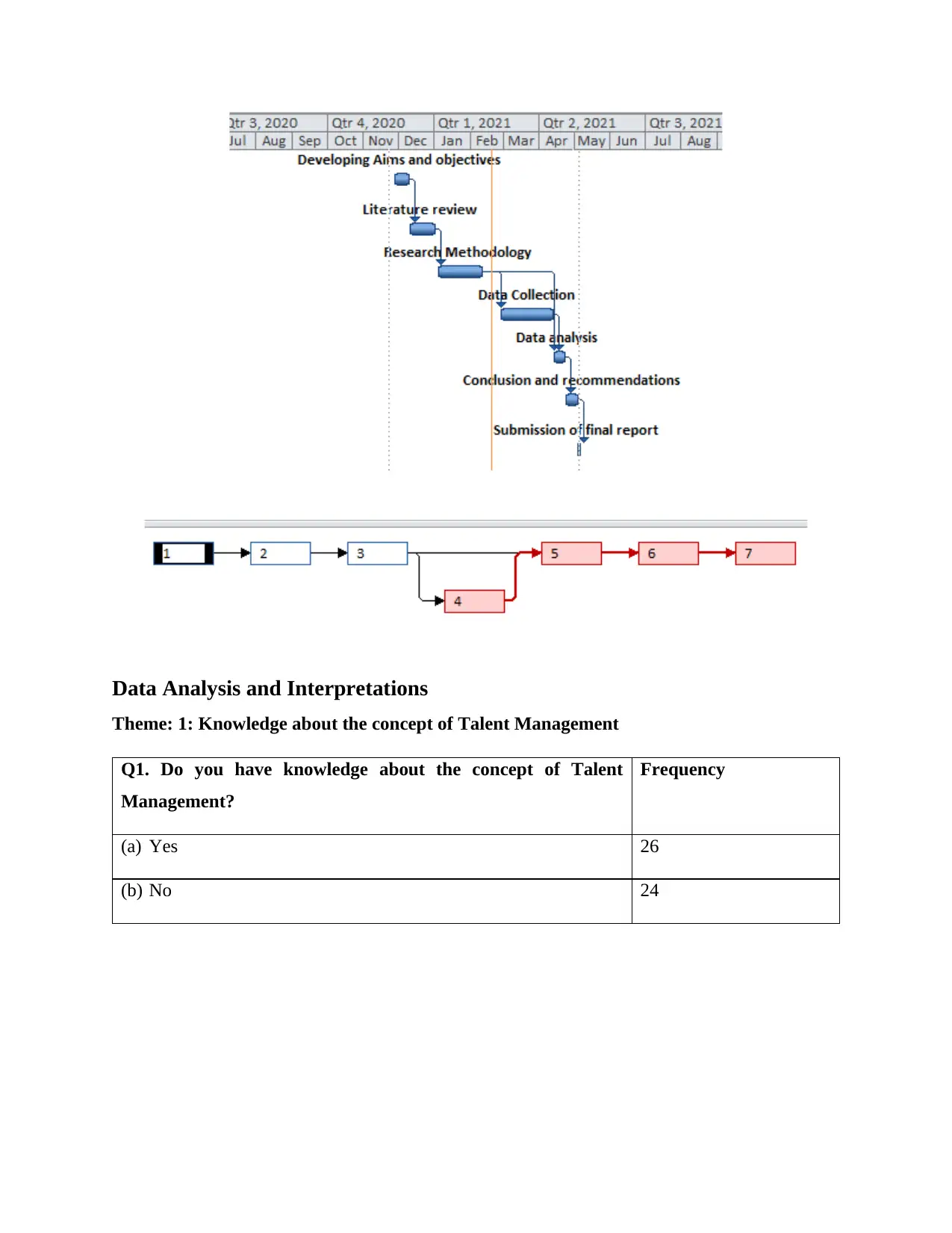
Data Analysis and Interpretations
Theme: 1: Knowledge about the concept of Talent Management
Q1. Do you have knowledge about the concept of Talent
Management?
Frequency
(a) Yes 26
(b) No 24
Theme: 1: Knowledge about the concept of Talent Management
Q1. Do you have knowledge about the concept of Talent
Management?
Frequency
(a) Yes 26
(b) No 24
⊘ This is a preview!⊘
Do you want full access?
Subscribe today to unlock all pages.

Trusted by 1+ million students worldwide
1 out of 34
Related Documents
Your All-in-One AI-Powered Toolkit for Academic Success.
+13062052269
info@desklib.com
Available 24*7 on WhatsApp / Email
![[object Object]](/_next/static/media/star-bottom.7253800d.svg)
Unlock your academic potential
Copyright © 2020–2025 A2Z Services. All Rights Reserved. Developed and managed by ZUCOL.





